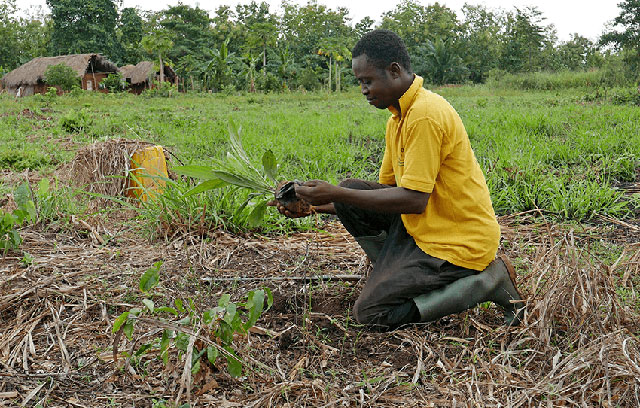
Growing a Better Future for Ghana’s Youth
George almost left his home country of Ghana for the uncertain promise of better opportunity in Europe. Now, this 33-year-old former Salesian student aspires to teach other young people how to grow a more sustainable future at home.
“I have a great and wonderful dream: eating what I cultivate, and sustaining my country — maybe even all of Africa — through my agricultural production,” says George. “And I want to be a living example to help others to understand that agriculture is a great opportunity, and a viable alternative to leaving Ghana.”
George’s ideas may seem somewhat revolutionary, especially in a country whose ongoing battle with income inequality; educational disparities; and a lack of adequate water, sanitation and other vital infrastructure seems to suggest that such opportunities are futile. In fact, a lack of hope drives thousands of youth away each year. During their journeys across the desert they are exposed to dangerous conditions such as for human trafficking. But it is precisely these situations that George hopes to combat, one small-scale farm at a time.
Together with Stop Human Trafficking — a global, Salesian-led education and prevention campaign launched in October 2015 — Salesian missionaries in the rural Brong-Ahafo region of Ghana have also introduced a new agricultural project. This program will teach local farmers how to move away from their traditional slash-and-burn techniques, and toward a self-contained form of production that does not deplete the area of vegetation, water reserves and soil nutrients.
“Slash-and-burn may provide newly-cleared areas on which to plant, but after one season, farmers must find new plots due to nutrient loss and soil infertility,” explains Father Krzysztof Nizniak, a Salesian missionary helping to lead the project in Ghana. “As more and more areas are burned, fewer and fewer plots — and opportunities to work — are available. We hope this new project will help build true community resilience, where local farms can both drastically reduce food insecurity and provide meaningful employment opportunities for youth.”
Since its founding, Stop Human Trafficking has prioritized projects in those countries whose youth are most at risk for migration, and subsequent exploitation and abuse. With funding from the organization, this new agricultural project will first install wells on four specially selected farms. Then, it will employ experienced tutors to teach other local farmers how to manage their small plots of land to ensure continued food productivity.
As a former student of the Don Bosco Agricultural Technical School in Sunyani, Ghana, George is a perfect tutoring candidate — and he looks forward to his new responsibility. “I believe Ghana’s future starts with the earth,” he says.
“We believe in George’s strong will and his dedication,” says Fr. Krzysztof. “And we are convinced with the right support, he will become an important point of reference for the area’s future farmers.”
Our mission teaches resilience and sustainability so that developing communities can thrive and survive. What’s your mission?

